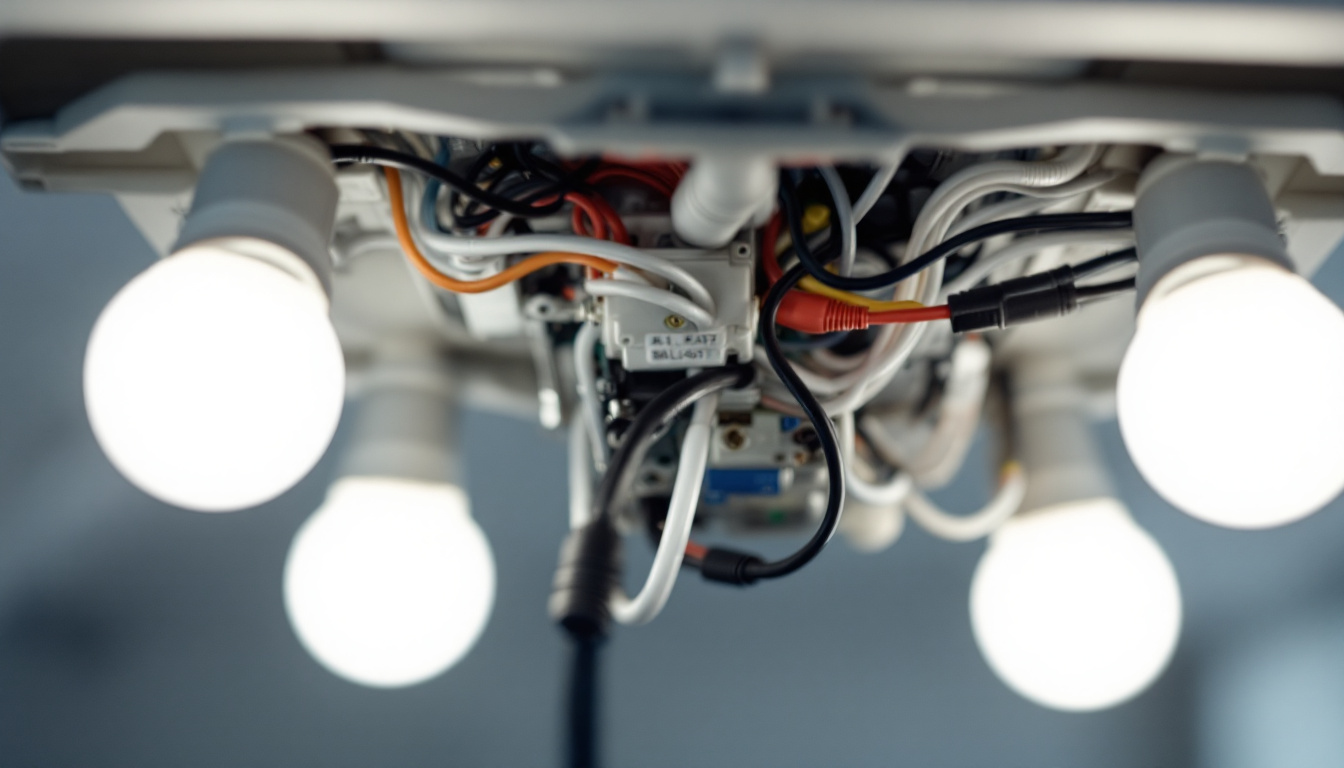
As the demand for sustainable and energy-efficient solutions continues to rise, lighting contractors are increasingly turning to LED solar lighting systems. These systems not only reduce energy costs but also provide a reliable source of illumination in various applications. However, to maximize the benefits of LED solar lighting, contractors must adhere to best practices that ensure optimal performance and customer satisfaction. This article outlines essential strategies that lighting contractors should implement when working with LED solar technologies.
Before delving into best practices, it is crucial for lighting contractors to have a solid understanding of LED solar lighting systems. These systems combine light-emitting diode (LED) technology with solar power, allowing for efficient and environmentally friendly lighting solutions. The integration of these technologies not only enhances energy efficiency but also promotes sustainability, making them an attractive option for both residential and commercial applications.
LED solar lighting systems typically consist of several key components: solar panels, batteries, LED fixtures, and control systems. The solar panels capture sunlight and convert it into electricity, which is stored in batteries for use during the night or in low-light conditions. The LED fixtures provide bright and energy-efficient illumination, while the control systems manage the operation of the lights, including dimming and motion sensors. In addition to these core components, many modern systems also incorporate smart technology, allowing for remote monitoring and control via mobile applications, enhancing user convenience and system efficiency.
The advantages of LED solar lighting are numerous. First and foremost, these systems reduce reliance on grid electricity, leading to lower energy bills. Additionally, they are often easier to install than traditional lighting systems, as they do not require extensive wiring or electrical infrastructure. Furthermore, LED solar lights are environmentally friendly, producing no emissions and utilizing renewable energy sources. Another significant benefit is their versatility; they can be used in a variety of settings, from illuminating pathways and gardens to providing security lighting for commercial properties. This adaptability makes them a popular choice for municipalities looking to enhance public spaces while minimizing their carbon footprint.
Moreover, the longevity of LED fixtures contributes to their cost-effectiveness. With lifespans often exceeding 25,000 hours, these lights require less frequent replacements compared to conventional bulbs, further reducing maintenance costs. The combination of low operational costs and minimal environmental impact positions LED solar lighting as a forward-thinking solution for communities aiming to embrace green technologies. As more advancements are made in solar efficiency and LED technology, the potential for these systems to revolutionize outdoor lighting continues to grow, paving the way for smarter, more sustainable urban environments.
Successful installation of LED solar lighting systems is critical to their performance and longevity. Contractors should follow specific best practices to ensure that installations are efficient and effective.
Before installation, conducting a thorough site assessment is essential. This involves evaluating the location for solar exposure, potential obstructions, and the intended use of the lighting. Factors such as tree cover, building shadows, and geographical orientation can significantly impact the performance of solar panels. By understanding these elements, contractors can make informed decisions about the placement and type of solar lights to install. Furthermore, it’s beneficial to involve the end-users in this assessment process, as their insights on lighting needs and preferences can lead to a more satisfactory outcome. Engaging with the community can also help identify any specific concerns or requirements, such as safety and visibility in high-traffic areas.
The placement of solar panels is crucial for maximizing energy absorption. Ideally, panels should be positioned to receive direct sunlight for the majority of the day. This may require adjusting the angle of the panels or selecting locations that are free from shade. Contractors should also consider seasonal changes in sunlight exposure, ensuring that the panels will continue to receive adequate sunlight throughout the year. In addition to these factors, it is wise to account for local weather patterns, as regions with frequent cloud cover or heavy rainfall may require solar panels with higher efficiency ratings. Regular maintenance checks can also help ensure that any debris or dirt that accumulates on the panels is promptly cleared, maintaining optimal performance.
Not all LED fixtures are created equal. Contractors must select fixtures that are appropriate for the specific application, whether it be street lighting, pathway illumination, or garden lighting. Factors to consider include lumen output, color temperature, and durability. Additionally, selecting fixtures with built-in sensors can enhance energy efficiency by allowing lights to dim or turn off when not needed. It is also important to evaluate the materials used in the fixtures; those made from corrosion-resistant materials will be better suited for outdoor installations, particularly in areas prone to harsh weather conditions. Moreover, incorporating smart technology, such as remote monitoring systems, can provide real-time data on energy consumption and performance, allowing for timely adjustments and improvements in the lighting system’s efficiency.
Regular maintenance is essential to ensure the longevity and efficiency of LED solar lighting systems. Contractors should establish a maintenance schedule and educate clients on the importance of upkeep.
Routine inspections should be conducted to assess the condition of solar panels, batteries, and LED fixtures. This includes checking for dirt or debris on the solar panels, which can hinder their performance. Cleaning the panels periodically will help maintain their efficiency. Additionally, contractors should inspect the batteries for signs of wear or damage, as this can affect the system’s ability to store energy.
Lighting contractors should be prepared to troubleshoot common issues that may arise with LED solar lighting systems. For instance, if lights are not functioning, it may be due to insufficient sunlight exposure, faulty batteries, or damaged fixtures. Understanding how to diagnose these problems can help contractors provide timely solutions for their clients, enhancing customer satisfaction and trust.
Educating clients about LED solar lighting is an essential aspect of a contractor’s role. Clients who understand the benefits and functionality of their lighting systems are more likely to appreciate their value and invest in maintenance.
One of the most compelling selling points of LED solar lighting is the potential for energy savings. Contractors should take the time to explain how these systems can lower electricity bills and reduce carbon footprints. Providing clients with data or case studies can help illustrate these benefits effectively.
Contractors should also discuss the capabilities of the installed system, including features such as motion sensors, dimming options, and programmable settings. Clients may not be aware of the full range of functionalities available, and educating them can lead to enhanced satisfaction and usage of the system.
In an ever-evolving industry, lighting contractors should stay informed about technological advancements in LED solar lighting. Embracing new technologies can lead to improved solutions and increased efficiency.
Smart lighting systems are becoming increasingly popular in the realm of LED solar lighting. These systems utilize IoT (Internet of Things) technology to provide enhanced control and monitoring capabilities. Contractors should consider integrating smart features such as remote control, scheduling, and real-time monitoring into their installations. This not only enhances user experience but also allows for better energy management.
Many modern LED solar lighting systems come with mobile applications that allow users to control their lights from their smartphones. Contractors should familiarize themselves with these applications and demonstrate their use to clients. This added convenience can significantly enhance the appeal of the lighting systems.
Lighting contractors must ensure that their installations comply with local regulations and standards. This not only protects the contractor but also ensures the safety and satisfaction of the client.
Before beginning any installation, contractors should familiarize themselves with local building codes and regulations regarding outdoor lighting. This includes understanding restrictions on light pollution, energy efficiency standards, and safety requirements. Compliance with these codes is essential for avoiding fines and ensuring the safety of the installation.
In some cases, contractors may need to obtain permits before installing LED solar lighting systems. It is crucial to research and secure any required permits to avoid potential legal issues down the line. This proactive approach not only protects the contractor but also instills confidence in clients regarding the professionalism and reliability of the contractor.
As the demand for LED solar lighting solutions grows, effective marketing strategies become essential for lighting contractors looking to expand their client base.
One effective marketing strategy is to showcase successful projects. Contractors can create a portfolio of completed installations, highlighting the benefits and features of each project. This visual representation of their work can attract potential clients and demonstrate the contractor’s expertise in LED solar lighting.
Social media and online platforms are powerful tools for marketing LED solar lighting services. Contractors should leverage these platforms to share project updates, client testimonials, and educational content about the benefits of LED solar lighting. Engaging with the community online can help build a strong brand presence and attract new clients.
LED solar lighting presents a wealth of opportunities for lighting contractors, offering energy-efficient and sustainable solutions for a variety of applications. By adhering to best practices in installation, maintenance, client education, and marketing, contractors can ensure successful projects and satisfied clients. Staying informed about technological advancements and regulatory requirements will further enhance the contractor’s ability to deliver exceptional services in this growing market.
Ultimately, the future of lighting lies in innovative and eco-friendly solutions, and lighting contractors play a pivotal role in shaping that future. By embracing LED solar lighting and implementing these best practices, contractors can position themselves as leaders in the industry, ready to meet the demands of an increasingly environmentally conscious clientele.
Ready to elevate your lighting projects with the most efficient and sustainable LED solar lighting solutions? At LumenWholesale, we provide lighting contractors like you with spec-grade products that meet the highest industry standards. Say goodbye to inflated markups and hello to superior lighting at unbeatable wholesale prices. Plus, with free shipping on bulk orders, you can trust that you’re getting premium quality without hidden fees. Don’t compromise on quality or value—choose LumenWholesale for the perfect blend of affordability and convenience. Start browsing our selection now and take advantage of the best value in wholesale lighting at LumenWholesale.

Illuminate your projects with expertise using our comprehensive guide, “Wall Bulb: The Ultimate Handbook for Lighting Contractors.” Discover innovative techniques, essential tools, and industry insights to elevate your lighting installations to new heights.

Discover the step-by-step guide to bypassing ballasts in 4-bulb fixtures, ensuring your lighting projects are efficient and future-ready.

Discover how solar-powered outdoor pendant lights are revolutionizing the lighting industry for contractors.

Discover the key factors that distinguish top lighting contractors when it comes to Tube T8 LED installations.